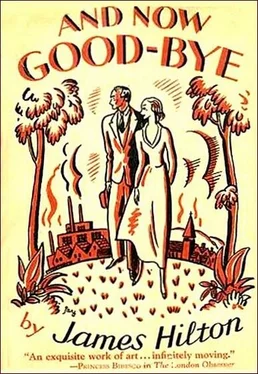“I know,” Howat said. “But then, you’re so certain of the good you do—you know it—you can see it with your own eyes—people whom you’ve cured walk about the streets as a living reminder and proof.”
“And a damn sight worse off some of ’em are than if I’d killed ’em! My dear chap, it isn’t a matter of doing good, it’s a matter of carrying on with a job. If I once began to think in terms of ethics, I should probably send old mother Roseway an overdose of strychnine to-night—yes, and a dozen others I could name. Fortunately I’m content to plod along at the job I’m paid for, and it’s a pity you can’t be satisfied in the same way. After all, you preach, you visit, you bury and marry and all that, you run no end of societies and things—I should imagine you give pretty good value for money, on the whole.”
“It isn’t even that. I’ve got to satisfy myself.”
Ringwood approached Howat and laid a firm hand on his shoulder. “You know, Freemantle, I should say you were in for a fairly serious breakdown if you don’t take care. You want a holiday—some kind of change from this infernal round of visiting old women and singing temperance hymns.” His voice, which had been serious for a moment, relapsed into its more usual bantering tone as he added: “Personally I never take holidays of the ordinary kind—haven’t done for twenty years—but when I feel myself getting a bit edgy I ring up Hudson and hand him over my practice for two or three days; then I pop off to London and have a real good beano. Dinner at a chophouse, then the silliest show I can find, then a few drinks wherever I can get them, then—well, I wouldn’t like to tell you all that is on the programme sometimes when I’m in town. But it doesn’t often happen—I find a few days of dissipation lasts me longer now than it used to. Growing old, I suppose that’s what it is.”
Howat smiled. “I’m sure you can’t really see me doing anything of that sort. Though as a matter of fact I do happen to be going to London this Friday—I’ve got to come to terms with a firm about supplying a new heating apparatus for the chapel.”
“Well, there’s your chance. You won’t be all day choosing a heating apparatus. And I don’t expect you’ll hurry back to this benighted spot by the very next train, will you?”
“I shall put up for the night at one of those bed-and-breakfast hotels in Southampton Row, and probably catch the 10.30 back on Saturday morning.”
“Rubbish, man! Stay in town and make a week-end of it!”
“Perhaps I might except for the fact that I have a Bazaar committee- meeting and a young men’s class on Saturday evening and two services to take on Sunday, as well as Sunday school and the Armistice service. People don’t realise that a parson has work to do—indeed, I hardly dare mention to most people that I’m going to London; they look at me with that ‘lucky dog’ expression, as if I were just treating myself to a holiday.”
“Which is precisely what you ought to be doing. Anyhow, you’ll have one night in town—and take my tip: make a real night of it—dinner and theatre—don’t stint yourself—don’t go to bed till the small hours. Remember that: I shall ask you, mind, when you get back, for a full report, and if you haven’t taken my prescription there’ll be trouble!”
They laughed and chatted on for a few minutes longer, until Howat looked at his watch and said he must be going. He rose and glanced shyly at Ringwood, for momentarily he had an impulse to tell the doctor about that pain in his throat. Why not, after all?—it would save a few guineas, and if it were anything serious…but the mere possibility checked the words long before they could have reached his lips. Ringwood had been a good friend for years, and Howat suspected real affection behind the ferocity of manner; it would all be so much less unnerving with someone whom he did not know.
He said good-bye, but Ringwood insisted on driving him back to the Manse. When at last he was alone in his study, glancing at a few things that had arrived by the evening post, he began to think in some detail about his Friday plans. He would travel up by a morning train, arriving in London soon after lunch; he could see the engineering people in the early afternoon, and then be at Wimpole Street for four. And after that? It would depend, of course, on how he felt; he might not be in the mood for anything at all. A pity, perhaps, that he couldn’t get back to Browdley the same night…He tore open the wrapper of the London Times , which was sent him by post each day, and on the front page an announcement caught his eye—a violin and piano recital at the Cavendish Hall on Friday evening; a good programme, too—Schumann, Beethoven, Brahms. Sometimes, in earlier years and at very rare intervals, he had made special trips to London to attend some particular concert or recital; he had not done so lately, for financial reasons, but now the thought of sitting once again in a concert-hall and listening to Brahms (Brahms of all composers) gave him a sudden pricking of anticipation 3 whatever dreadful things were in store for him on Friday, that would at least help to redress the balance. He wondered if they would play the Sonata in A major. The opening theme of the first movement began to pour through his mind in a clear stream; it reminded him of something, of somebody, of somewhere he had once heard it before, and not so very long before—curious, yes—he remembered now—he had heard that ’girl humming it at the beginning of one of those German lessons, and he had been too surprised at the time to make a remark or ask a question. Perhaps, he now reflected, she had picked it up from the cinema musician.
He slept rather well (it might have been, he guessed, that Ringwood’s pick-me-up had contained something to make him do so) and woke up feeling considerably refreshed; then, after breakfast, a rare mood seized him, and for the first time for many months he did not spend his allotted morning hours in the study. Instead he adjourned to the room on the opposite side of the lobby—the parlour, a chilly bay-windowed apartment used only on fairly infrequent occasions, and furnished in a style which future period connoisseurs will perhaps extol as Edwardian. There was a litter of spindly chairs, a large-patterned and highly-coloured Axminster, and a good deal of poor-quality inlaid work and china in cabinets. The only object, however, which lured him to this unrewarding scene at nine o’clock on a November morning was the pianoforte—an upright German instrument, not very good in tone, but on the other hand not nearly as bad as its surroundings might have suggested. On and off since he got out of bed Howat had been thinking of that concert on Friday evening; he had already begun to feel a little excited about it, and excitement had put him in one of his periodic moods for what his wife called ‘making up bits of tunes’. She could never see much point in the occupation, for although some of the tunes had occasionally won prizes in competitions, they were never ‘printed,’ as she said, nor did they seem to her at all attractive when Howat played them over to her. She also disliked the sound of improvising and experimentation on the piano, and complained that even in the bedroom she could hear it, and that it always gave her a headache. Howat, therefore, never devoted himself to his ’tunes while she was in the house, which meant that for years he had had very few opportunities of doing so at all. But this morning, Mrs. Freemantle, contrary to usual habit, had taken breakfast downstairs and had gone out immediately afterwards with Aunt Viney; there was a sale at a dress shop in a neighbouring town, and it was most important that she should arrive in time.
Читать дальше











